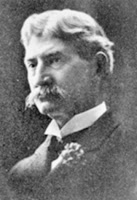.jpg) |
| President Lincoln. National Archives, Matthew Brady. |
Lincoln profoundly impacted the new Territory throughout his time in office. A week after the Territory was created, he appointed William H. Wallace as the first governor. Wallace was both a political ally and a personal friend of Lincoln’s. He was probably also related to William Smith Wallace, the Lincoln family physician and brother-in-law to Mary (Todd) Lincoln. (Both Wallaces traced their roots to Scottish emigrant families in central and eastern Pennsylvania.)
Lincoln also appointed a Territorial Secretary, three justices for a Territorial court system, and a U. S. Marshal. He selected Sidney Edgerton, another Midwestern attorney, as Chief Justice. The Marshal, Dolphus S. Payne, would be condemned as the perpetrator of the infamous “Laramie Fraud” in the Territory’s first elections later that year [blog, Oct 31].
Almost a year passed before he finally appointed the Territorial Attorney. (Territorial residents voted for a legislature – Representatives and Councilors – but the Federal government controlled everything else.)
When Wallace resigned to become Idaho’s elected Delegate to the U. S. Congress, Lincoln appointed New York politician Caleb Lyon as governor. Intelligent, well-educated, but rather bombastic in speech and manner, Lyon received more derision than respect during his stay in Idaho. Worse by far, however, was simply his status as a Republican appointee. He was thus bound to clash with a legislature dominated by Democrats, many of whom were Southern sympathizers.
Lincoln again impacted Idaho history when, in 1864, he signed legislation that split off Montana Territory [blog, May 26] and gave Idaho something like its present boundaries. Along with that, Lincoln appointed Idaho’s Chief Justice Edgerton to be governor of the new Territory.
Finally, less than two months before his assassination, Lincoln made his last significant Idaho appointment: He selected John McBride [blog, Feb 28] as Chief Justice to replace Sidney Edgerton.
 |
| Levi Ankeny. Library of Congress. |
On November 6, 1871, voters elected Levi Ankeny mayor of Lewiston. This had two interesting consequences. First, under his administration an important “loose end” was tied up with regard to the Lewiston town site.
According to the Illustrated History of North Idaho, “the government had granted the city a tract of land one square mile in extent at the junction of the Clearwater and Snake rivers, but the land office had as yet failed to act in granting a patent and the matter was held in abeyance.”
That, of course, meant that title to every tract of land within the city could be disputed. Ankeny followed through to insure that the grant was properly executed, “though not without litigation.”
Ankeny was a long-time pioneer in the area. In 1862, Captain Ankeny and some partners operated a steamboat, The Spray, on the Snake. Their steamer, with a purposely shallow draft, could navigate the Clearwater during its late-season low water. The partners sold out at nearly a 100% profit after a year. Later, Ankeny owned a Lewiston general store and ran cattle on land southeast of town.
The second result from the mayoral election was to give Ankeny a taste of success in politics. He later moved to the state of Washington and took up banking. Then, from 1903 to 1909, he represented that state in the U.S. Senate, serving on several important committees. He died in March 1921.
| References: [B&W], [Brit], [Hawley], [Illust-North] |
| “Levi Ankeny,” Biographical Directory of the United State Congress (online) |

No comments:
Post a Comment